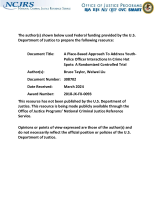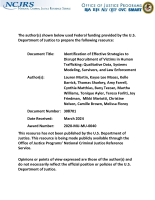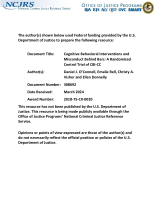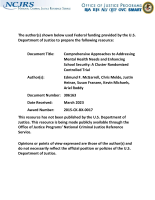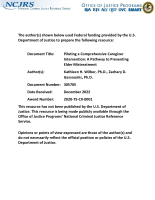Intervention
Identification of Effective Strategies to Disrupt Recruitment of Victims in Human Trafficking: Qualitative Data, Systems Modeling, Survivors, and Law Enforcement
Cognitive Behavioral Interventions and Misconduct Behind Bars: A Randomized Control Trial of CBI-CC
Webinar Transcript: NIJ FY 24 Evaluation on Desistance
NIJ hosted a webinar providing an overview of the NIJ FY 24 Evaluation on Desistance Solicitation, in which NIJ seeks proposals for rigorous evaluations of desistance-focused interventions to advance understanding of strategies that might aid in the desistance process and identify innovative approaches to measure the desistance process.
Transcript...
Multidisciplinary Teams, Street Outreach, and Gang Intervention: Mixed Methods Findings from a Randomized Controlled Trial in Denver
Criminal offense charges in women: A 10-year follow-up of an RCT of treatment foster care Oregon
Elder Abuse Identification and Intervention
Applying an empirically derived effect size distribution to benchmark the practical magnitude of interventions to reduce recidivism in the USA
Results from an effectiveness evaluation of anti-bias training on police behavior and public perceptions of discrimination
Comprehensive Older Adult and Caregiver Help (COACH): A person-centered caregiver intervention prevents elder mistreatment
Developing a Strategy to Evaluate Urban Violence Prevention and Intervention Ecosystems: A Case Study of Boston
What Works to Reduce Violent Gun Crime in Focused Deterrence Initiatives? Estimating the Effect of Services and Enforcement in Facilitating Desistence Among Prolific Violent Offenders
Meeting People Where They Are to Improve Institutional Culture
Incarcerated individuals deserve opportunities for healing and growth, but they often lack the necessary resources for such opportunities. Additionally, organizational cultures that don’t support these outcomes often stand in the way. Researchers and practitioners gathered at NIJ’s 2023 National Research Conference to share ideas and projects that will increase opportunities for incarcerated populations around the country. This show continues their conversation.
Driving Down Gun Violence, Part 1
Three LEADS Scholars serving in different law enforcement agencies and positions discuss their experiences with identifying and implementing evidence-based interventions to reduce gun violence. NIJ Senior Advisor Dr. Tamara Herold hosts this conversation with guests Police Chief Cecilia Ashe (Milford Delaware Police Department), Chief of Staff Lieutenant Matthew Barter (Manchester, NH Police Department), and Analytical Services Manager Mr. Jason Schiess (Durham, NC Police Department).
Coaching Teachers in Bullying Detection and Intervention
Effect of Community-Based Interventions on High-Risk Drinking and Alcohol-Related Injuries
Comprehensive Approaches to Addressing Mental Health Needs and Enhancing School Security: A Cluster Randomized Controlled Trial
Economic Justice for Survivors of Intimate Partner Violence
See the YouTube Terms of Service and Google Privacy Policy
Piloting a Comprehensive Caregiver Intervention: A Pathway to Preventing Elder Mistreatment
What works to reduce violent gun crime in focused deterrence initiatives? Estimating the effect of services and enforcement in facilitating desistence among prolific violent offenders in Tampa
Assessing the Effectiveness of Interventions Designed to Reduce Racial/Ethnic Disparities in the Justice System: A Systematic Review and Meta-Analysis
Formative Evaluation of a Hospital-based Violence Intervention Programs and Victim Services in Chicago
Learning from Doing Evaluating the Effectiveness of the Second Chance Act Grant Program
Reauthorized in 2018, the Second Chance Act (SCA) aims to reduce recidivism and improve outcomes for people returning from state and federal prisons, local jails, and juvenile facilities through the provision of federal grants. During this panel, National Institute of Justice-funded researchers will detail two ongoing evaluations of the SCA grant program:
- An evaluation of the effectiveness of the SCA grant program per Title V of the First Step Act.
- A longitudinal examination of the long-term impacts of the SCA program.
See the YouTube Terms of Service and Google Privacy Policy


